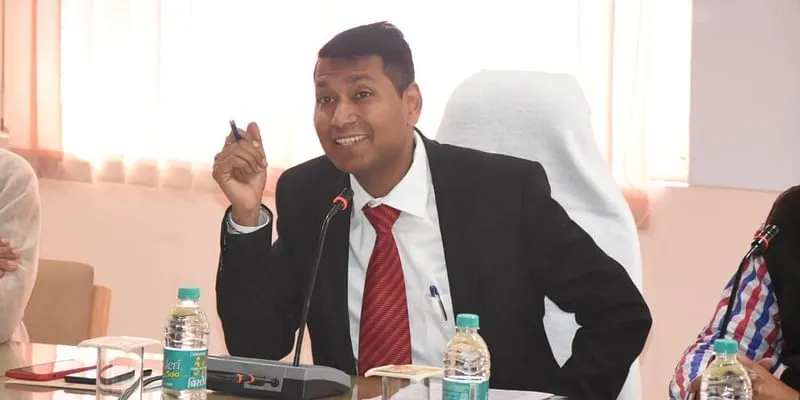How the Rajasthan government’s special skilling programmes are creating frontline support against COVID-19
Neeraj K Pawan, Labour secretary and Chairman of Rajasthan Skills and Livelihood Development Corporation (RSLDC), on how the state added 5,500 skilled workers to aid medical staff.
The COVID-19 pandemic has put unprecedented pressure on medical services across the globe. In Rajasthan, with the increased demand for healthcare services, there is significant support coming from a huge workforce skilled under various state government programmes.
Speaking to SocialStory, Rajasthan's Labour Secretary and Chairman of Rajasthan Skills and Livelihood Development Corporation (RSLDC) Neeraj K Pawan told us more about the various initiatives undertaken by the state government.

Rajasthan's Labour Secretary and Chairman of Rajasthan Skills and Livelihood Development Corporation (RSLDC) Neeraj K Pawan
Social Story (SS): How many people have been trained under the state government programmes and how are they helping in the fight against COVID?
Neeraj K Pawan (NKP): Having been skilled under various RSLDC programmes, more than 5,500 trained professionals are presently offering services at hospitals, COVID care centres, and even with home-based patient care.
Over the past few years, they have been trained as emergency medical technicians, general duty assistants, dialysis technicians, nursing assistants, and other healthcare support services. The training provides them the knowledge and confidence required to fulfil their responsibilities.
COVID-19 is a highly infectious disease, and it is necessary that those working in close proximity to such patients are well trained. Actively supporting the medical staff, these trained professionals are contributing immensely towards the management of the pandemic in Rajasthan.
Healthcare has been a priority sector for RSLDC; additionally, the corporation has also skilled thousands of people in trades such as electrical and plumbing services, among others.
SS: RSLDC has initiated the health sector skilling programmes even before the pandemic. What inspired the decision?
NKP: Public health has always been a priority issue for Rajasthan Chief Minister Ashok Gehlot. The state government through its flagship schemes such as Nirogi Rajasthan and Chiranjeevi Swasthy Bima Yojna is trying to ensure quality healthcare for all citizens.
This has created huge employment opportunities in the medical support services and accordingly, RSLDC has been working to generate a skilled workforce for the expanding sector while providing better job opportunities for people.
The pandemic was unexpected; however, the availability of skilled manpower has helped the health services to operate even during this high-pressure situation.
SS: How has been the feedback from these trained professionals, how do they feel about working on COVID-19 duty?
NKP: We have reached out to several of those trained under our programmes and they are presently working with COVID patients. All of them were thankful for the skilling programme. Standing on the frontline of COVID-19 services, most have discovered a zeal to serve.
They have enrolled for skill training in pursuit of a stable career and better employment opportunities; however, today they are contributing more to their family and society.
Many of them have never received so much recognition for their work. They are helping to ease the suffering of COVID-19 patients at hospitals and homes.
SS: How is home-based care being aided by the skilling programme?
NKP: Hundreds have been trained under skilling programs of Home Health Aide, Frontline Health Workers, and Domestic Assistant- Elderly Care. Many of them have also been attending to COVID-19 patients at home. They are not just helping the patients with medicine and routine work, but are also a moral support for those in isolation.
In several cases, patients require post-COVID-19 care, and many non-COVID-19 patients are choosing home based-nursing. This has led to an increase in demand for skilled nursing and domestic health aides.
SS: How many people have been trained under each of these modules over the past two years?
NKP: Since 2019, RSLDC has trained more than 3,956 general duty assistants, 428 bedside assistants, 442 frontline health workers, 198 emergency medical technicians (basic), 161 dialysis technicians, 58 medical laboratory technicians, 64 nursing assistants, 59 home health aides, and 30 domestic assistants (Elderly Care).
The range of modules helps the trainees choose the area of work in accordance with their preferences while generating skilled manpower for various duties in healthcare services.
SS: Will these services remain in demand post-pandemic? What are the future prospects for these skilled people?
NKP: Even after the pandemic is over, people will be more cautious with their health. An expansion of public healthcare services will continue to create demand for support services. Geriatric care would also need more skilled people in the coming days.
Those skilled today will gain experience with time and will be preferred for more responsible duties. These health professionals may also undertake other associated skilling modules to increase employment avenues.
Edited by Diya Koshy George







